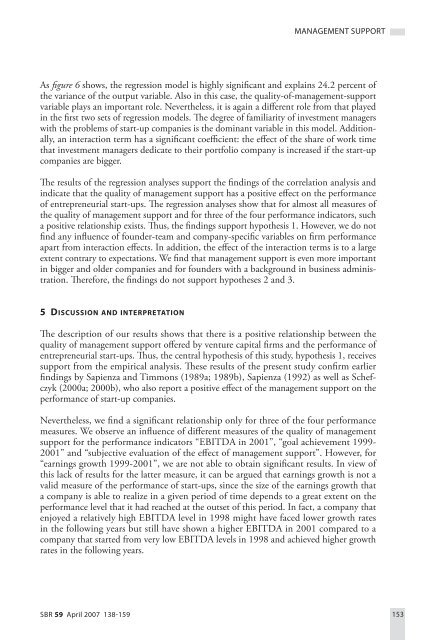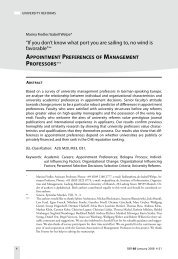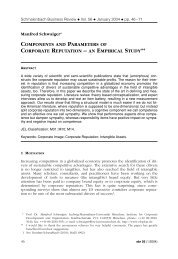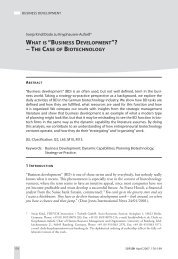management support and the performance of entrepreneurial start-ups
management support and the performance of entrepreneurial start-ups
management support and the performance of entrepreneurial start-ups
Create successful ePaper yourself
Turn your PDF publications into a flip-book with our unique Google optimized e-Paper software.
MANAGEMENT SUPPORT<br />
As fi gure 6 shows, <strong>the</strong> regression model is highly signifi cant <strong>and</strong> explains 24.2 percent <strong>of</strong><br />
<strong>the</strong> variance <strong>of</strong> <strong>the</strong> output variable. Also in this case, <strong>the</strong> quality-<strong>of</strong>-<strong>management</strong>-<strong>support</strong><br />
variable plays an important role. Never<strong>the</strong>less, it is again a diff erent role from that played<br />
in <strong>the</strong> fi rst two sets <strong>of</strong> regression models. Th e degree <strong>of</strong> familiarity <strong>of</strong> investment managers<br />
with <strong>the</strong> problems <strong>of</strong> <strong>start</strong>-up companies is <strong>the</strong> dominant variable in this model. Additionally,<br />
an interaction term has a signifi cant coeffi cient: <strong>the</strong> eff ect <strong>of</strong> <strong>the</strong> share <strong>of</strong> work time<br />
that investment managers dedicate to <strong>the</strong>ir portfolio company is increased if <strong>the</strong> <strong>start</strong>-up<br />
companies are bigger.<br />
Th e results <strong>of</strong> <strong>the</strong> regression analyses <strong>support</strong> <strong>the</strong> fi ndings <strong>of</strong> <strong>the</strong> correlation analysis <strong>and</strong><br />
indicate that <strong>the</strong> quality <strong>of</strong> <strong>management</strong> <strong>support</strong> has a positive eff ect on <strong>the</strong> <strong>performance</strong><br />
<strong>of</strong> <strong>entrepreneurial</strong> <strong>start</strong>-<strong>ups</strong>. Th e regression analyses show that for almost all measures <strong>of</strong><br />
<strong>the</strong> quality <strong>of</strong> <strong>management</strong> <strong>support</strong> <strong>and</strong> for three <strong>of</strong> <strong>the</strong> four <strong>performance</strong> indicators, such<br />
a positive relationship exists. Th us, <strong>the</strong> fi ndings <strong>support</strong> hypo<strong>the</strong>sis 1. However, we do not<br />
fi nd any infl uence <strong>of</strong> founder-team <strong>and</strong> company-specifi c variables on fi rm <strong>performance</strong><br />
apart from interaction eff ects. In addition, <strong>the</strong> eff ect <strong>of</strong> <strong>the</strong> interaction terms is to a large<br />
extent contrary to expectations. We fi nd that <strong>management</strong> <strong>support</strong> is even more important<br />
in bigger <strong>and</strong> older companies <strong>and</strong> for founders with a background in business administration.<br />
Th erefore, <strong>the</strong> fi ndings do not <strong>support</strong> hypo<strong>the</strong>ses 2 <strong>and</strong> 3.<br />
5 DISCUSSION AND INTERPRETATION<br />
Th e description <strong>of</strong> our results shows that <strong>the</strong>re is a positive relationship between <strong>the</strong><br />
quality <strong>of</strong> <strong>management</strong> <strong>support</strong> <strong>of</strong>f ered by venture capital fi rms <strong>and</strong> <strong>the</strong> <strong>performance</strong> <strong>of</strong><br />
<strong>entrepreneurial</strong> <strong>start</strong>-<strong>ups</strong>. Th us, <strong>the</strong> central hypo<strong>the</strong>sis <strong>of</strong> this study, hypo<strong>the</strong>sis 1, receives<br />
<strong>support</strong> from <strong>the</strong> empirical analysis. Th ese results <strong>of</strong> <strong>the</strong> present study confi rm earlier<br />
fi ndings by Sapienza <strong>and</strong> Timmons (1989a; 1989b), Sapienza (1992) as well as Schefczyk<br />
(2000a; 2000b), who also report a positive eff ect <strong>of</strong> <strong>the</strong> <strong>management</strong> <strong>support</strong> on <strong>the</strong><br />
<strong>performance</strong> <strong>of</strong> <strong>start</strong>-up companies.<br />
Never<strong>the</strong>less, we fi nd a signifi cant relationship only for three <strong>of</strong> <strong>the</strong> four <strong>performance</strong><br />
measures. We observe an infl uence <strong>of</strong> diff erent measures <strong>of</strong> <strong>the</strong> quality <strong>of</strong> <strong>management</strong><br />
<strong>support</strong> for <strong>the</strong> <strong>performance</strong> indicators “EBITDA in 2001”, “goal achievement 1999-<br />
2001” <strong>and</strong> “subjective evaluation <strong>of</strong> <strong>the</strong> eff ect <strong>of</strong> <strong>management</strong> <strong>support</strong>”. However, for<br />
“earnings growth 1999-2001”, we are not able to obtain signifi cant results. In view <strong>of</strong><br />
this lack <strong>of</strong> results for <strong>the</strong> latter measure, it can be argued that earnings growth is not a<br />
valid measure <strong>of</strong> <strong>the</strong> <strong>performance</strong> <strong>of</strong> <strong>start</strong>-<strong>ups</strong>, since <strong>the</strong> size <strong>of</strong> <strong>the</strong> earnings growth that<br />
a company is able to realize in a given period <strong>of</strong> time depends to a great extent on <strong>the</strong><br />
<strong>performance</strong> level that it had reached at <strong>the</strong> outset <strong>of</strong> this period. In fact, a company that<br />
enjoyed a relatively high EBITDA level in 1998 might have faced lower growth rates<br />
in <strong>the</strong> following years but still have shown a higher EBITDA in 2001 compared to a<br />
company that <strong>start</strong>ed from very low EBITDA levels in 1998 <strong>and</strong> achieved higher growth<br />
rates in <strong>the</strong> following years.<br />
SBR 59 April 2007 138-159 153






